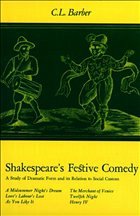" I have been led into an exploration of the way the social form of Elizabethan holidays contributed to the dramatic form of festive comedy. To relate this drama to holiday has proved to be the most effective way to describe its character. And this historical interplay between social and artistic form has an interest of its own: we can see here, with more clarity of outline and detail than is usually possible, how art develops underlying configurations in the social life of a culture."--C. L. Barber, in the Introduction
"Shakespeare's Festive Comedy is the best book on the subject that I know. The book is well and clearly written, and I should think would fascinate the general readers. I think it is indispensable for students of Shakespeare's comedy."--Francis Fergusson
"C. L. Barber is the most compelling of the anthropological critics and his book, Shakespeare's Festive Comedy, is to my mind far and away the most illuminating yet to appear on its subject. He is compelling for many reasons--a mind both intricate and deft, a sensitivity quick to the accommodation of esthetic form to the intricacies of psychological function, a humanity benignly tolerant and inclusive. . . . The especial merit of Barber's criticism lies in its sensitive exploration of the individual working out of the release-clarification formula in five separate plays. Each, he discovers, 'tends to focus on a particular kind of folly that is released along with love--witty masquerade in Love's Labour's Lost, delusive fantasy in A Midsummer Night's Dream, romance in As You Like It, and in The Merchant of Venice, prodigality balanced against usuary.' Twelfth Night, to complete the list, focuses on misrule and its complementary folly of time-serving."--Arthur M. Eastman, in A Short History of Shakespearean Criticism
"Shakespeare's Festive Comedy is the best book on the subject that I know. The book is well and clearly written, and I should think would fascinate the general readers. I think it is indispensable for students of Shakespeare's comedy."--Francis Fergusson
"C. L. Barber is the most compelling of the anthropological critics and his book, Shakespeare's Festive Comedy, is to my mind far and away the most illuminating yet to appear on its subject. He is compelling for many reasons--a mind both intricate and deft, a sensitivity quick to the accommodation of esthetic form to the intricacies of psychological function, a humanity benignly tolerant and inclusive. . . . The especial merit of Barber's criticism lies in its sensitive exploration of the individual working out of the release-clarification formula in five separate plays. Each, he discovers, 'tends to focus on a particular kind of folly that is released along with love--witty masquerade in Love's Labour's Lost, delusive fantasy in A Midsummer Night's Dream, romance in As You Like It, and in The Merchant of Venice, prodigality balanced against usuary.' Twelfth Night, to complete the list, focuses on misrule and its complementary folly of time-serving."--Arthur M. Eastman, in A Short History of Shakespearean Criticism

